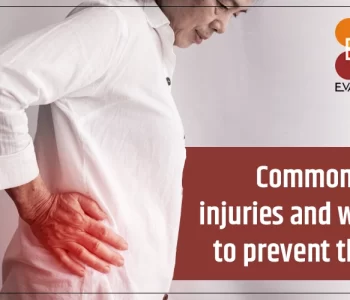 Hip Replacement surgery
Hip Replacement surgery
Common hip injuries and ways to prevent them
Hip injuries are extremely painful aside from causing major mobility issues. A pain from an injured hip would not only affect that area but also pass on towards your legs, sciatica, groin and spine. Consequently, your mobility will be highly restricted. This is why it becomes pertinent to understand what the recurring causes of such injuries are. Accordingly, all preventive methods should be put in place to avoid hip discomfort and injuries.
Who is at risk of developing a hip injury?
The hip is a ball-and-socket joint where the thigh bone (femur) meets the hip bone (pelvis). The joint is basically the meeting place of the ball at the end of the femur, which fits in a socket in the pelvis. Even though an extremely robust joint allows a human being a variety of motions, the joint will suffer injury in case of overuse, trauma and strain, etc.
Anyone in any age group can suffer a hip injury. For instance, active sportspersons, whether they are children, teenagers, or adults, are at high risk of a hip injury. The same is true of elderly and people with weight issues.
Hip injury: People at higher risk
- Sportspersons of any age
- Senior citizens
- Overweight people
Common hip injuries/conditions
Common hip injuries include
- Strains
- Labral Tear
- Dislocations
- Fractures
- Bursitis
- Hip osteoarthritis
- Hip dysplasia
- Hip Instability
- Gluteus Medius Tears
- Arthritis
- Tendinitis
- Avascular Necrosis
Symptoms of hip injury
Depending on the exact nature of the injury, you may feel pain in the following areas of your body:
- Inside of the hip joint
- Outside of the hip joint
- Groin
- Thigh
- Buttocks
Hip injury prevention
- Maintain a healthy weight.
- Workout regularly, focusing on exercises that strengthen the hip joint and muscles.
- Adopt a diet that focuses on bone heath creation and maintenance.
- Warm-up exercises are a must for sportspersons.
- Rest adequately before and after the exercise. Don’t keep your body in a permanent state of exhaustion.
- Those whose work demands them to sit in a chair throughout the day must take small breaks to walk.
- Don’t leave minor injuries unattended. If there is persistent pain, no matter how insignificant, you may need to visit a doctor.
When to see a doctor?
In case of minor issues, over the counter medication, rest and ice and heat compression could provide relief. However, see a doctor immediately if the pain persists, causing limited mobility.